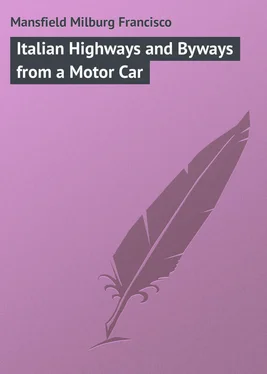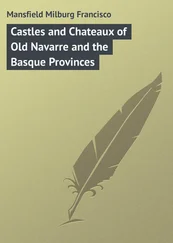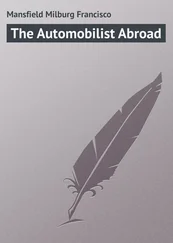Milburg Mansfield - Italian Highways and Byways from a Motor Car
Здесь есть возможность читать онлайн «Milburg Mansfield - Italian Highways and Byways from a Motor Car» — ознакомительный отрывок электронной книги совершенно бесплатно, а после прочтения отрывка купить полную версию. В некоторых случаях можно слушать аудио, скачать через торрент в формате fb2 и присутствует краткое содержание. Жанр: foreign_prose, Путешествия и география, на английском языке. Описание произведения, (предисловие) а так же отзывы посетителей доступны на портале библиотеки ЛибКат.
- Название:Italian Highways and Byways from a Motor Car
- Автор:
- Жанр:
- Год:неизвестен
- ISBN:нет данных
- Рейтинг книги:3 / 5. Голосов: 1
-
Избранное:Добавить в избранное
- Отзывы:
-
Ваша оценка:
- 60
- 1
- 2
- 3
- 4
- 5
Italian Highways and Byways from a Motor Car: краткое содержание, описание и аннотация
Предлагаем к чтению аннотацию, описание, краткое содержание или предисловие (зависит от того, что написал сам автор книги «Italian Highways and Byways from a Motor Car»). Если вы не нашли необходимую информацию о книге — напишите в комментариях, мы постараемся отыскать её.
Italian Highways and Byways from a Motor Car — читать онлайн ознакомительный отрывок
Ниже представлен текст книги, разбитый по страницам. Система сохранения места последней прочитанной страницы, позволяет с удобством читать онлайн бесплатно книгу «Italian Highways and Byways from a Motor Car», без необходимости каждый раз заново искать на чём Вы остановились. Поставьте закладку, и сможете в любой момент перейти на страницу, на которой закончили чтение.
Интервал:
Закладка:
The chief disadvantages of the hotel of the small Italian town are its often crowded and incomplete accessories, and its proximity to a stable of braying donkeys, bellowing cows, or an industrious blacksmith who begins before sun-up to pound out the same metallic ring that his confrères do all over the world. There is nothing especially Italian about a blacksmith’s shop in Italy. All blacksmith interiors are the same whether painted by “Old Crome,” Eastman Johnson or Jean François Millet.
The idiosyncrasies of the inns of the small Italian towns do not necessarily preclude their offering good wholesome fare to the traveller, and this in spite of the fact that not every one likes his salad with garlic in liberal doses or his macaroni smothered in oil. Each, however, is better than steak smothered in onions or potatoes fried in lard; any “hygienist” will tell you that.
The trouble with most foreigners in Italy, when they begin to talk about the rancid oil and other strange tasting native products, is that they have not previously known the real thing. Olive oil, real olive oil, tastes like – well, like olive oil. The other kinds, those we are mostly used to elsewhere, taste like cotton seed or peanut oil, which is probably what they are. One need not blame the Italian for this, though when he himself eats of it, or gives it you to eat, it is the genuine article. You may eat it or not, according as you may like it or not, but the Italian isn’t trying to poison you or work off anything on your stomach half so bad as the rancid bacon one sometimes gets in Germany or the kippers of two seasons ago that appear all over England in the small towns.
As before intimated, the chief trouble with the small hotels in Italy is their deficiencies, but the Touring Club Italiano in Italy, like the Touring Club de France in France, is doing heroic work in educating the country inn-keeper. Why should not some similar institution do the same thing in England and America? How many American country hotels, in towns of three or five thousand people, in say Georgia or Missouri, would get up, for the chance traveller who dropped in on them unexpectedly, a satisfactory meal? Not many, the writer fancies.
There is, all over Europe, a desire on the part of the small or large hotel keeper to furnish meals out of hours, and often at no increase in price. The automobilist appreciates this, and has come to learn in Italy that the old Italian proverb “ chi tardi arriva mal alloggia ” is entirely a myth of the guide books of a couple of generations ago. A cold bird, a dish of macaroni, a salad and a flask of wine will try no inn-keeper’s capabilities, even with no notice beforehand. The Italian would seemingly prefer to serve meals in this fashion than at the tavola rotonda , which is the Italian’s way of referring to a table d’hôte . If you have doubts as to your Italian Boniface treating you right as to price (after you have eaten of his fare) arrange things beforehand a prezzo fisso and you will be safe.
As for wine, the cheapest is often as good as the best in the small towns, and is commonly included in the prezzo fisso , or should be. It’s for you to see that you get it on that basis of reckoning.
The padrona of an Italian country inn is very democratic; he believes in equality and fraternity, and whether you come in a sixty-horse Mercédès or on donkey-back he sits you down in a room with a mixed crew of his countrymen and pays no more attention to you than if you were one of them. That is, he doesn’t exploit you as does the Swiss, he doesn’t overcharge you, and he doesn’t try to tempt your palate with poor imitation of the bacon and eggs of old England, or the tenderloins of America. He gives you simply the fare of the country and lets it go at that.
Of Italian inns, it may be truly said the day has passed when the traveller wished he was a horse in order that he might eat their food; oats being good everywhere.
The fare of the great Italian cities, at least that of the hotels frequented by tourists, has very little that is national about it. To find these one has to go elsewhere, to the small Italian hotels in the large towns, along with the priests and the soldiers, or keep to the byways.
The polenta , or corn-meal bread, and the companatico , sardines, anchovies or herrings which are worked over into a paste and spread on it butter-wise, is everywhere found, and it is good. No osteria or trattoria by the roadside, but will give you this on short order if you do not seek anything more substantial. The minestra , or cabbage soup – it may not be cabbage at all, but it looks it – a sort of “ omnium gatherum ” soup – is warming and filling. Polenta , companatico , minestra and a salad, with fromaggio to wind up with, and red wine to drink, ought not to cost more than a lira, or a lira and a half at the most wherever found. You won’t want to continue the same fare for dinner the same day, perhaps, but it works well for luncheon.
Pay no charges for attendance. No one does anyway, but tourists of convention. Let the buono mano to the waiter who serves you be the sole largess that you distribute, save to the man-of-all-work who brings you water for the thirsty maw of your automobile, or to the amiable, sunshiny individual who lugs your baggage up and down to and from your room. This is quite enough, heaven knows, according to our democratic ideas. At any rate, pay only those who serve you, in Italy, as elsewhere, and don’t merely tip to impress the waiter with your importance. He won’t see it that way.
The Italian albergo , or hotel of the small town, is apt to be poorly and meanly furnished, even in what may be called “public rooms,” though, indeed, there are frequently no public rooms in many more or less pretentious Italian inns. If there ever is a salon or reception room it is furnished scantily with a rough, uncomfortable sofa covered with a gunny sack, a small square of fibre carpeting (if indeed it has any covering whatever to its chilly tile or stone floor), and a few rush covered chairs. Usually there is no chimney, but there is always a stuffy lambrequined curtain at each window, almost obliterating any rays of light which may filter feebly through. In general the average reception room of any Italian albergo (except those great joint-stock affairs of the large cities which adopt the word hotel) is an uncomfortable and unwholesome apartment. One regrets to say this but it is so.
Beds in Italian hotels are often “queer,” but they are surprisingly and comfortably clean, considering their antiquity. Every one who has observed the Italian in his home, in Italy or in some stranger land, even in a crowded New York tenement, knows that the Italian sets great store by his sleeping arrangements and their proper care. It is an ever-to-be-praised and emulated fact that the common people of continental Europe are more frequently “luxurious” with regard to their beds and bed linen than is commonly supposed. They may eat off of an oilcloth (which by some vague conjecture they call “American cloth”) covered table, may dip their fingers deep in the polenta and throw bones on the tile or brick floor to the dogs and cats edging about their feet, but the draps of their beds are real, rough old linen, not the ninety-nine-cent-store kind of the complete house-furnishing establishments.
The tiled floor of the average Italian house, and of the kitchens and dining room of many an Italian inn, is the ever at hand receptacle of much refuse food that elsewhere is relegated to the garbage barrel. Between meals, and bright and early in the morning, everything is flushed out with as generous a supply of water as is used by the Dutch housvrou in washing down the front steps. Result: the microbes don’t rest behind, as they do on our own carpeted dining rooms, a despicable custom which is “growing” with the hotel keepers of England and America. Another idol shattered!
Читать дальшеИнтервал:
Закладка:
Похожие книги на «Italian Highways and Byways from a Motor Car»
Представляем Вашему вниманию похожие книги на «Italian Highways and Byways from a Motor Car» списком для выбора. Мы отобрали схожую по названию и смыслу литературу в надежде предоставить читателям больше вариантов отыскать новые, интересные, ещё непрочитанные произведения.
Обсуждение, отзывы о книге «Italian Highways and Byways from a Motor Car» и просто собственные мнения читателей. Оставьте ваши комментарии, напишите, что Вы думаете о произведении, его смысле или главных героях. Укажите что конкретно понравилось, а что нет, и почему Вы так считаете.












